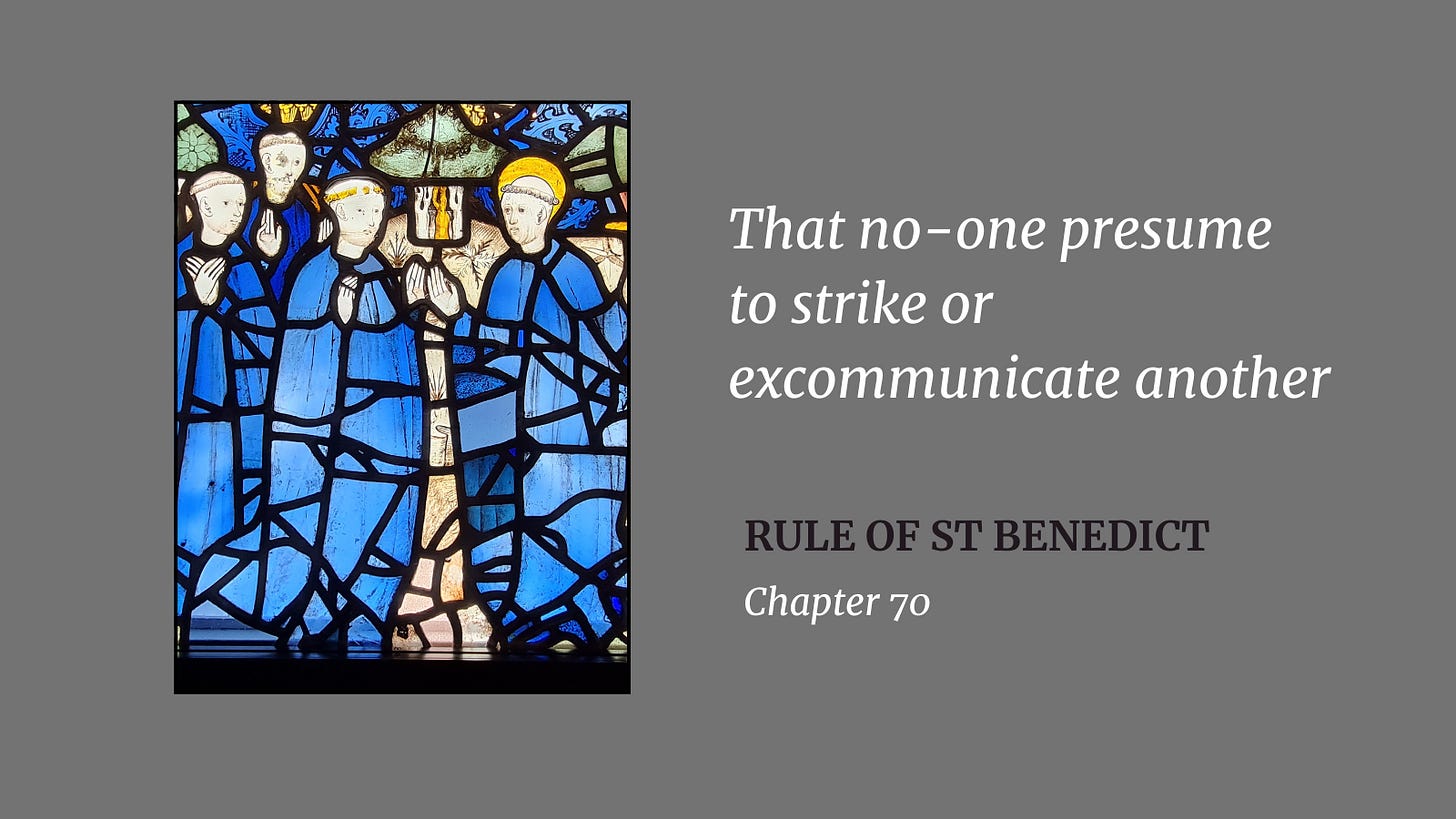The Rule of St Benedict Chapter 70
That no-one presume to strike or excommunicate another
So that in the monastery every occasion of presumption be avoided, we ordain and determine that no-one may excommunicate or strike any of his brothers, unless the Abbot shall have given him the power to do so.
Vitetur in monasterio omnis præsumptionis occasio; ordinamus atque constituimus ut nulli liceat quemquam fratrum suorum excommunicare aut cædere, nisi cui potestas ab Abbate date fuerit.
However, those that sin before all are to be reprimanded, so that the rest may have fear.
Peccantes autem coram omnibus arguantur ut ceteri metum habeant.
Children, however, until their fifteenth year, shall be kept under diligent and watchful discipline by all; but this with all measure and reasonableness.
Infantum vero usque quindecim annorum ætates disciplinæ diligentia ab omnibus et custodia sit; sed et hoc cum omni mensura et ratione.
For if anyone presumes, without the instruction of the Abbot, to chastise those of greater age or young children without discretion, let him undergo the discipline of the Rule, for it is written: What you do not wish to be done to you, do not to another.
Nam in fortiori ætate qui præsumit aliquatenus sine præcepto abbatis vel in ipsis infantibus sine discretione exarserit, disciplinæ regulari subiaceat, quia scriptum est: Quod tibi non vis fieri, alio ne feceris.
In these posts I take a chapter of St Benedict’s Rule for monks, translate it and add some comments from monastic writers or from my own experience.
Comment
To us, so many centuries after the Rule was written, telling monks they cannot hit each other seems a bit unexpected. Surely this is assumed? The general response to this is that people had rougher manners back then, and historical records do tell us that physical altercations did happen. Even today, brawls can break out in places like the Holy Sepulchre!
But actually the purpose of this chapter is a little deeper; it’s all about authority, limits of authority and moderation. We come back to the idea of a structured community, where each one has his role, purpose and limits. Arbitrary actions are unacceptable as they break the order which should hold in the community.
This chapter reminds us that monasteries routinely contained children, many of whom would be monks (oblates) or intending to become monks. Some might be there for educational purposes; all the brothers may correct and discipline children. Once they reach the age of 15 they are considered an adult and so that general permission falls away. Anyone who disciplines an adult without due authority is to be subject to the punishment of the Rule. However, St Benedict anticipates that a monk might behave too harshly to a child and so he includes in this provision those who act without “measure and reasonableness.”
St Benedict reminds us of the chapter on the Instruments of Good Works here (Chapter 4) where he states “not to do to another what one would not have done to oneself.”
So why can anyone reprimand those who “sin before all”? Dom Delatte suggests that St Benedict is making a distinction between serious corporal punishment or excommunication and more minor correction.
Dom Delatte sums this chapter up:
The ordinances of this chapter are primarily addressed to those who have no authority to correct their brethren; they also concern all those who are invested by the monastic penal code, by lawful custom, or by special delegation, with ordinary or extraordinary right of correction, when they overstep the bounds of what is permitted by the Rule and by prudence. Speaking generally, all correction should fulfil following conditions: the corrector should have power to correct, the cause should be just and reasonably adequate, and the punishment should be proportioned to the fault.
The effect of correction will be much jeopardized, if it is manifest that we are yielding to impatience, or to natural antipathy, or to irritability of temperament: let us keep our antipathies for our own faults.
Order and moderation. These two things really sum up the Rule of St Benedict.
Next Chapter
If you don’t want to take out a paid subscription, but wish to support my writing please consider leaving a tip! Thanks for your support.
Have you seen my new publication - Shepherd’s Prayer? Available now via Amazon around the world, the isbn is: 979-8344184814.





